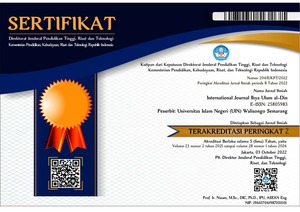Social Cohesion of Local Wisdom for Plural Communities
DOI:
https://doi.org/10.21580/ihya.23.2.8261Keywords:
Social Cohesion, Local Wisdom, Social Traditions, Nyadran, Plural Society.Abstract
Local culture and traditions represent local wisdom. Values applied in society. These values are believed to be accurate and become references in their daily behavior. The values of local knowledge are considered influential factors in determining the status and dignity of humans in their communities. Because these values contain intelligence, creativity, and local wisdom from their ancestors, figures, and society. The value of local wisdom that remains in our community is the nyadran ritual tradition. Nyadran is considered a socio-religious and socio-cultural reflection even as a social, cultural, and religious transformation. Nyadran is an expression of social piety where cooperation, solidarity, and togetherness are the main patterns of this tradition. The tradition in Jetis hamlet is in many ways able to develop primordial bonds in a cluster with the same beliefs and views despite different religions and beliefs. This research includes qualitative-exploratory research that requires qualitative data. As a case study, this research uses an ethnographic study approach, which is a tool for analyzing local wisdom whose data sources come from informants.
Downloads
References
Baehaki. Ahmad. 2017. Interview with observers and coaches of the Grobogan arts-culture community on 21 May.
Crevello, S. 2004. Dayak land use sys¬tems and indigenous knowledge. Journal of Human Ecology. Vol. 16.
Dhavamony. Mariasusai. 1995. Fenomenologi Agama. Yogyakarta: Kanisius.
Escobar. Arturo. 1994. Welcome to Cy¬beria: Notes on the Anthropology of Cyberculture. Journal Current Anthro-pology. Vol. 35(3).
Geertz. Clifford. 1973. Religion as a Cultural System. New York: Basic Books.
Geertz. Clifford. 1983. Abangan, Santri, Priyayi dalam Masyarakat Jawa. Jakarta: Pustaka Jaya.
Giri. Wahyana. 2010. Sajen dan Ritual Orang Jawa. Yogyakarta: Narasi.
Haba. John . 2007. Revitalisasi Kearifan Lokal: Studi Resolusi Konflik di Kalimantan Barat, Maluku, dan Poso. Jakarta: ICIP dan Eropean Commision.
Hartono. Yudi. 2012. “Kearifan Lokal Tradisi Uyen Sapi Perajut Integrasi Sosial (Studi Kasus di Desa Jonggol Kecamatan Jambon Kabupaten Ponorogo)”, dimuat dalam Jurnal Agastya, Vol. 02, No. 01.
Hogg. Jonathan. 2004. “The Ambiguity of Intellectual Engagement: Towards a Reassessment of Isaiah Berlin’s Leg¬acy,” Journal ERAS, Edisi 6.
Koentjaraningrat. 1990. Pengantar Ilmu Antropologi. Jakarta: Rineka Cipta.
Kongprasertamorn, K. 2007. Local wisdom, environmental protection and community development: the clam farmers in Tabon Bangkhusai, Phetchaburi Province, Thailand”, Journal of Humanities, Vol. 10.
Madjid. Nurcholish. 2014. Pluralisme Agama di Indonesia, Ulumul Qur’an, No. 3, Vol. 95.
Marjanto. Damardjati Kun. 2012. Kearifan Lokal Lingkungan Pada Upacara Perkawinan Suku Moi di Kabupaten Sorong. Jurnal Penelitian dan Pengembangan Kebudayaan, Vol. 07, No. 02.
Prayoto. Bi. 2017. Interview with youth leaders and professional artists of Jetis Village on 21 May.
Purwanto. 2017. Interview with the religious leaders of Jetis Village on 21 May.
Shalahuddin. Marwan. 2010. “Konservasi Budaya Lokal dalam Pembentukan Harmoni Sosial (Studi Kasus di Desa Klepu Sooko Ponorogo)”, dimuat dalam JURNAL HARMONI: Jurnal Multikultural & Multireligius, Vol. IX, No. 34.
Sukramran, Somboon. 1984. Religion, Politics and Development: The Thai Sangha’s Role in Natio-nal Development and Integration”, Journal of Social Science, Vol. 9 No. 12
Widy. 2017. Interview with Youth leaders of Jetis Village on 21 May.
Downloads
Published
How to Cite
Issue
Section
License
By submitting an article to the journal, the author(s) agree to transfer the published article's copyright to the journal, which will act as the publisher. This means the journal will have the right to publish the article in various forms, including reprints. The journal will maintain the publishing rights to the published articles.
This work is licensed under Creative Commons Attribution-ShareAlike 4.0 International License.
In line with the license, authors and third parties (readers, researchers, and others) are allowed to share and adapt the material. In addition, the material must be given appropriate credit, provided with a link to the license, and indicated if changes were made. If authors remix, transform or build upon the material, authors must distribute their contributions under the same license as the original.



